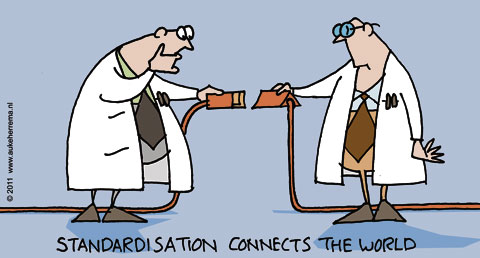Standardisation is not boring at all, says Tineke Egyedi, Delft researcher (TPM) and president of the European Academy for Standardisation, who organised a mini-symposium in Delft last month.
VHS over Betamax and Blu-ray Disc over HD DVD: after fierce battles – usually involving elaborate marketing tactics – certain formats gain a dominant position and become the so-called de facto standard. In the end, the market determines what standard is best.
Or at least that last statement is the adage of many policymakers and researchers in western countries who -to the regret of Tineke Egyedi – engage less and less with standardisation processes.
In fact standards are not only set by companies with market dominance over a certain technology; rather, there are thousands of standardisation organisations worldwide that bring stakeholders together to negotiate about standards that are beneficial for society as a whole. Take for instance the standard-sized metal container which made possible the worldwide transport of containers over land and sea. Or the internet protocol DCP/IP. These standards gave a boost to trade and innovation.
Asian countries take a completely different stand; they recognize the importance of standards for trade and innovation and they have made it part of their industrial policy. “The champion is South Korea,” says
Egyedi. “From elementary school onwards children learn about it. Children have to play with trains on two different sized train tracks, for instance. The importance of agreements really gets into their veins that way.”
Standardisation is full of intriguing political power plays, says Egyedi, who adds: “It’s absolutely not boring.” The belief that standardisation is dull also contributes to the lack of interest in this subject among scientists and policymakers, Egyedi argues. She is consequently lobbying the European Council to make the topic part of the educational curriculum.
Together with United Knowledge, a Dutch company, Egyedi has also developed a game – a serious game – called ‘Setting Standards’, which helps stakeholders, like policymakers, industries and non-profit organisations, gain a better grasp of all the ins and outs. At stake in the game is a fictional technology that allows people to control devices with their thoughts.
In the Netherlands, hardly anyone has shown interest in the game, but a Chinese delegation from the China National Institute of Standardisation (CNIS), which was present at the symposium, has shown interest in buying this serious game about standards.
“De eerste Fokke en Sukke verscheen in 1994 in Propria Cures”, zegt Van Tol. “Dat is het oudste studentenblad van Nederland. In 1997 kwam Ad Valvas van de Vrije Universiteit erbij. Daar stonden we een jaar of tien in. Steeds meer bladen wilden Fokke en Sukke plaatsen, maar na een tijdje werden het er weer minder. Het zijn er nog een stuk of tien.”
En nu is het genoeg geweest. “Ons eigen studentenleven ligt al vijftien jaar achter ons. De corpsbal die we graag tekenen, begint te verdwijnen. Wij dachten dat het van alle tijden was om lol te trappen, bier te drinken en daarnaast nog een beetje te studeren, maar dat is niet zo: studenten zijn nu veel efficiënter en meer betrokken, is mijn indruk. En ze drinken minder. We beginnen de aansluiting te verliezen.”
Universiteitsbladen kunnen bovendien een springplank voor jonge tekenaars zijn, meent Van Tol. “Eigenlijk houden wij nu hun plaats bezet. Dat we ophouden is ook een genereus gebaar naar nieuw talent.”
De vogels blijven wel in NRC Handelsblad en NRC Next. Ook zullen ze dagelijks in De Wereld Draait Door optreden.


VHS over Betamax and Blu-ray Disc over HD DVD: after fierce battles – usually involving elaborate marketing tactics – certain formats gain a dominant position and become the so-called de facto standard. In the end, the market determines what standard is best.
Or at least that last statement is the adage of many policymakers and researchers in western countries who -to the regret of Tineke Egyedi – engage less and less with standardisation processes.
In fact standards are not only set by companies with market dominance over a certain technology; rather, there are thousands of standardisation organisations worldwide that bring stakeholders together to negotiate about standards that are beneficial for society as a whole. Take for instance the standard-sized metal container which made possible the worldwide transport of containers over land and sea. Or the internet protocol TCP/IP. These standards gave a boost to trade and innovation.
Asian countries take a completely different stand; they recognize the importance of standards for trade and innovation and they have made it part of their industrial policy. “The champion is South Korea,” says
Egyedi. “From elementary school onwards children learn about it. Children have to play with trains on two different sized train tracks, for instance. The importance of agreements really gets into their veins that way.”
Standardisation is full of intriguing political power plays, says Egyedi, who adds: “It’s absolutely not boring.” The belief that standardisation is dull also contributes to the lack of interest in this subject among scientists and policymakers, Egyedi argues. She is consequently lobbying the European Council to make the topic part of the educational curriculum.
Together with United Knowledge, a Dutch company, Egyedi has also developed a game – a serious game – called ‘Setting Standards’, which helps stakeholders, like policymakers, industries and non-profit organisations, gain a better grasp of all the ins and outs. At stake in the game is a fictional technology that allows people to control devices with their thoughts.
In the Netherlands, hardly anyone has shown interest in the game, but a Chinese delegation from the China National Institute of Standardisation (CNIS), which was present at the symposium, has shown interest in buying this serious game about standards. Just like the American federal technology agency (NIST) did.


Comments are closed.